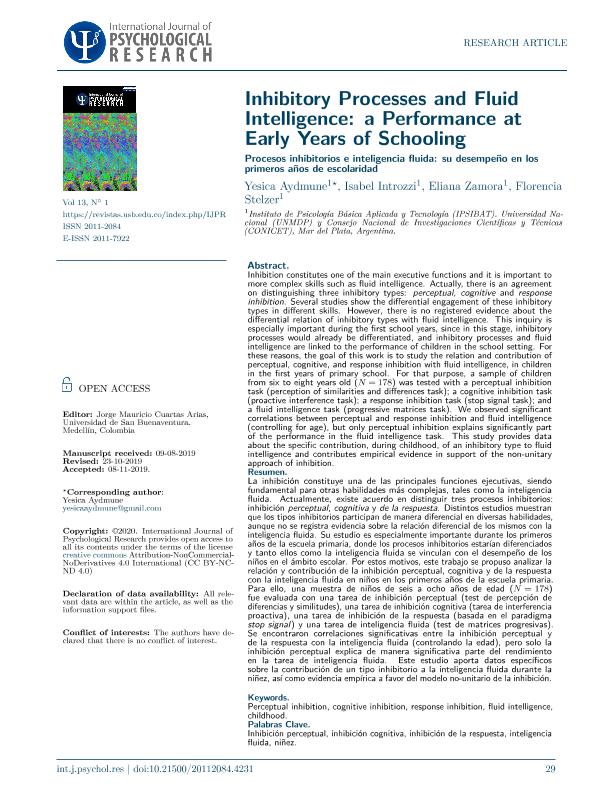Mostrar el registro sencillo del ítem
dc.contributor.author
Aydmune, Yésica

dc.contributor.author
Introzzi, Isabel Maria

dc.contributor.author
Zamora, Eliana Vanesa

dc.contributor.author
Stelzer, Florencia

dc.date.available
2021-09-30T10:55:06Z
dc.date.issued
2020-01
dc.identifier.citation
Aydmune, Yésica; Introzzi, Isabel Maria; Zamora, Eliana Vanesa; Stelzer, Florencia; Inhibitory Processes and Fluid Intelligence: a Performance at Early Years of Schooling; Universidad San Buenaventura; International Journal of Psychological Research; 13; 1; 1-2020; 29-39
dc.identifier.issn
2011-2084
dc.identifier.uri
http://hdl.handle.net/11336/142003
dc.description.abstract
La inhibición constituye una de las principales funciones ejecutivas, siendo fundamental para otras habilidades más complejas, tales como la inteligencia fluida. Actualmente, existe acuerdo en distinguir tres procesos inhibitorios: inhibición perceptual, cognitiva y de la respuesta. Distintos estudios muestran que los tipos inhibitorios participan de manera diferencial en diversas habilidades, aunque no se registra evidencia sobre la relación diferencial de los mismos con la inteligencia fluida. Su estudio es especialmente importante durante los primeros años de la escuela primaria, donde los procesos inhibitorios estarían diferenciados y tanto ellos como la inteligencia fluida se vinculan con el desempeño de los niños en el ámbito escolar. Por estos motivos, este trabajo se propuso analizar la relación y contribución de la inhibición perceptual, cognitiva y de la respuesta con la inteligencia fluida en niños en los primeros años de la escuela primaria. Para ello, una muestra de niños de seis a ocho años de edad (N = 178) fue evaluada con una tarea de inhibición perceptual (test de percepción de diferencias y similitudes), una tarea de inhibición cognitiva (tarea de interferencia proactiva), una tarea de inhibición de la respuesta (basada en el paradigma stop signal) y una tarea de inteligencia fluida (test de matrices progresivas). Se encontraron correlaciones significativas entre la inhibición perceptual y de la respuesta con la inteligencia fluida (controlando la edad), pero solo la inhibición perceptual explica de manera significativa parte del rendimiento en la tarea de inteligencia fluida. Este estudio aporta datos específicos sobre la contribución de un tipo inhibitorio a la inteligencia fluida durante la niñez, así como evidencia empírica a favor del modelo no-unitario de la inhibición.
dc.description.abstract
Inhibition constitutes one of the main executive functions and it is important to more complex skills such as fluid intelligence. Actually, there is an agreement on distinguishing three inhibitory types: perceptual, cognitive and response inhibition. Several studies show the differential engagement of these inhibitory types in different skills. However, there is no registered evidence about the differential relation of inhibitory types with fluid intelligence. This inquiry is especially important during the first school years, since in this stage, inhibitory processes would already be differentiated, and inhibitory processes and fluid intelligence are linked to the performance of children in the school setting. For these reasons, the goal of this work is to study the relation and contribution of perceptual, cognitive, and response inhibition with fluid intelligence, in children in the first years of primary school. For that purpose, a sample of children from six to eight years old (N = 178) was tested with a perceptual inhibition task (perception of similarities and differences task); a cognitive inhibition task (proactive interference task); a response inhibition task (stop signal task); and a fluid intelligence task (progressive matrices task). We observed significant correlations between perceptual and response inhibition and fluid intelligence (controlling for age), but only perceptual inhibition explains significantly part of the performance in the fluid intelligence task. This study provides data about the specific contribution, during childhood, of an inhibitory type to fluid intelligence and contributes empirical evidence in support of the non-unitary approach of inhibition.
dc.format
application/pdf
dc.language.iso
eng
dc.publisher
Universidad San Buenaventura
dc.rights
info:eu-repo/semantics/openAccess
dc.rights.uri
https://creativecommons.org/licenses/by-nc-nd/2.5/ar/
dc.subject
CHILDHOOD
dc.subject
COGNITIVE INHIBITION
dc.subject
FLUID INTELLIGENCE
dc.subject
PERCEPTUAL INHIBITION
dc.subject
RESPONSE INHIBITION
dc.subject.classification
Otras Psicología

dc.subject.classification
Psicología

dc.subject.classification
CIENCIAS SOCIALES

dc.title
Inhibitory Processes and Fluid Intelligence: a Performance at Early Years of Schooling
dc.title
Procesos inhibitorios e inteligencia fluida: su desempeño en los primeros años de escolaridad
dc.type
info:eu-repo/semantics/article
dc.type
info:ar-repo/semantics/artículo
dc.type
info:eu-repo/semantics/publishedVersion
dc.date.updated
2021-09-06T18:26:30Z
dc.identifier.eissn
2011-7922
dc.journal.volume
13
dc.journal.number
1
dc.journal.pagination
29-39
dc.journal.pais
Colombia

dc.description.fil
Fil: Aydmune, Yésica. Consejo Nacional de Investigaciones Científicas y Técnicas. Centro Científico Tecnológico Conicet - Mar del Plata. Instituto de Psicología Básica, Aplicada y Tecnología. Universidad Nacional de Mar del Plata. Facultad de Psicología. Instituto de Psicología Básica, Aplicada y Tecnología.; Argentina
dc.description.fil
Fil: Introzzi, Isabel Maria. Consejo Nacional de Investigaciones Científicas y Técnicas. Centro Científico Tecnológico Conicet - Mar del Plata. Instituto de Psicología Básica, Aplicada y Tecnología. Universidad Nacional de Mar del Plata. Facultad de Psicología. Instituto de Psicología Básica, Aplicada y Tecnología.; Argentina
dc.description.fil
Fil: Zamora, Eliana Vanesa. Consejo Nacional de Investigaciones Científicas y Técnicas. Centro Científico Tecnológico Conicet - Mar del Plata. Instituto de Psicología Básica, Aplicada y Tecnología. Universidad Nacional de Mar del Plata. Facultad de Psicología. Instituto de Psicología Básica, Aplicada y Tecnología.; Argentina
dc.description.fil
Fil: Stelzer, Florencia. Consejo Nacional de Investigaciones Científicas y Técnicas. Centro Científico Tecnológico Conicet - Mar del Plata. Instituto de Psicología Básica, Aplicada y Tecnología. Universidad Nacional de Mar del Plata. Facultad de Psicología. Instituto de Psicología Básica, Aplicada y Tecnología.; Argentina
dc.journal.title
International Journal of Psychological Research
dc.relation.alternativeid
info:eu-repo/semantics/altIdentifier/doi/http://dx.doi.org/10.21500/20112084.4231
dc.relation.alternativeid
info:eu-repo/semantics/altIdentifier/url/https://revistas.usb.edu.co/index.php/IJPR/article/view/4231
Archivos asociados
